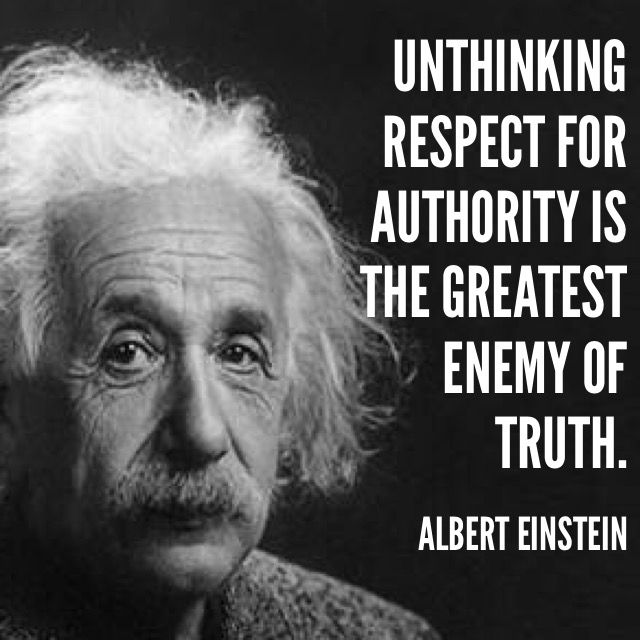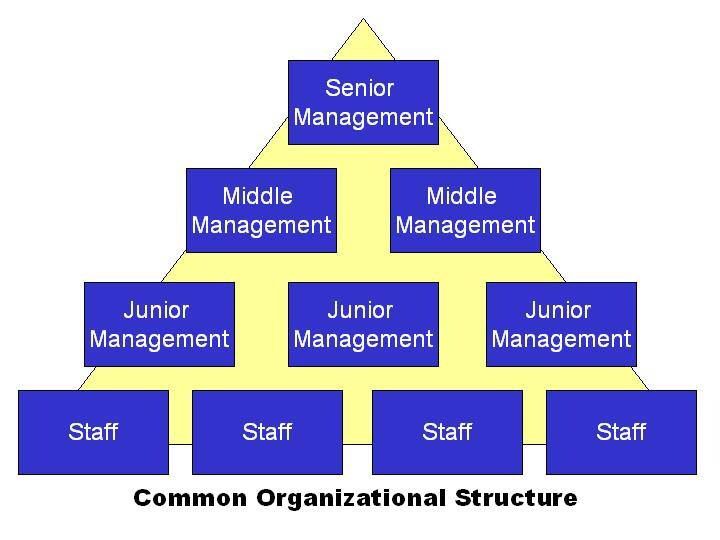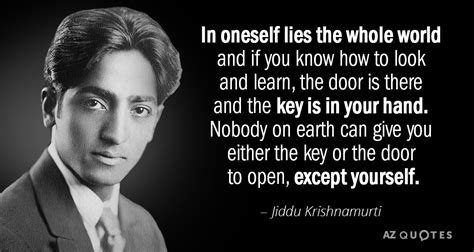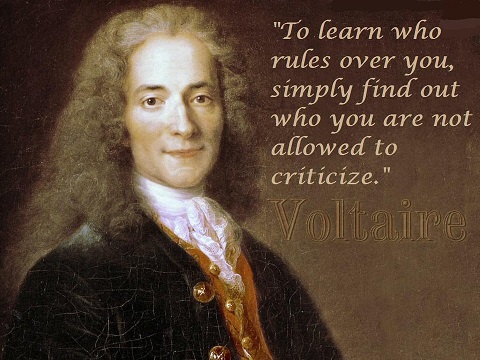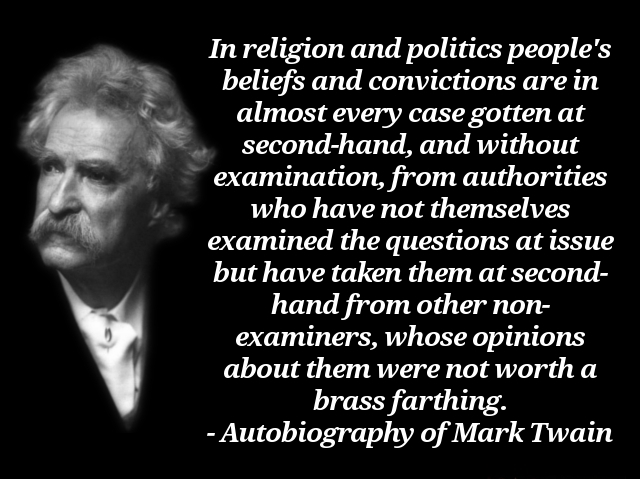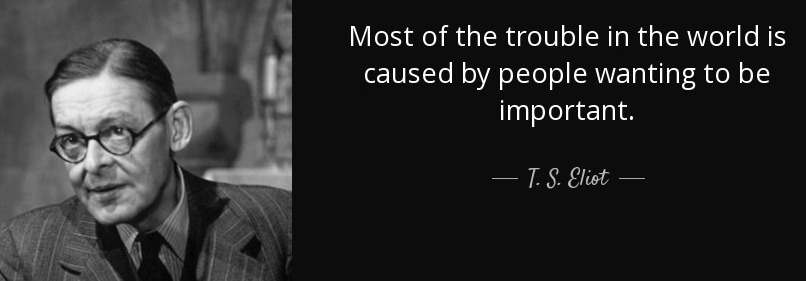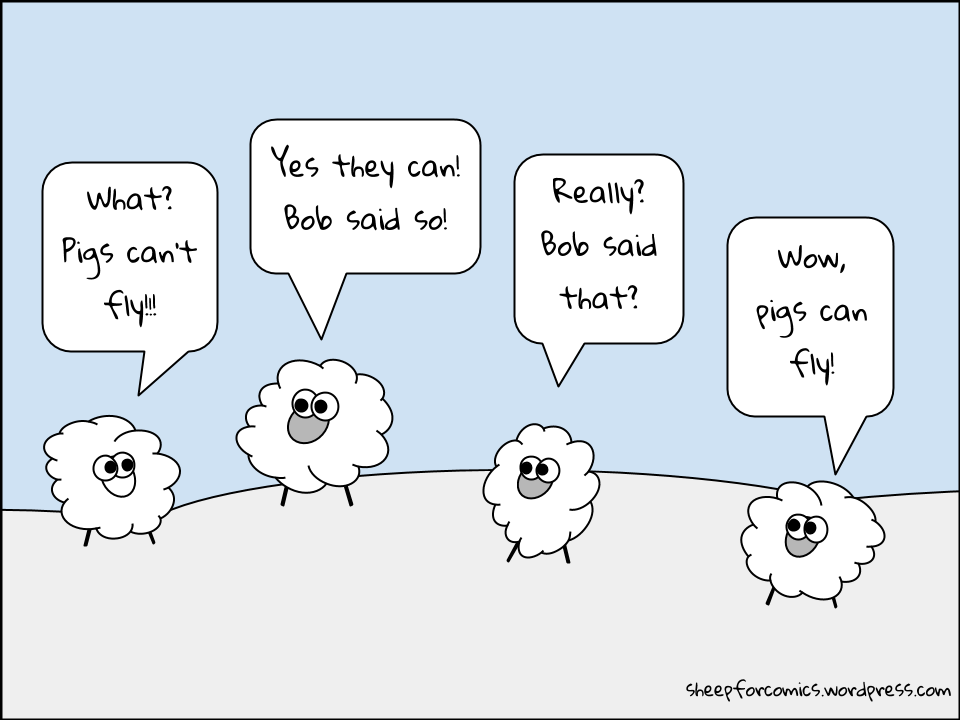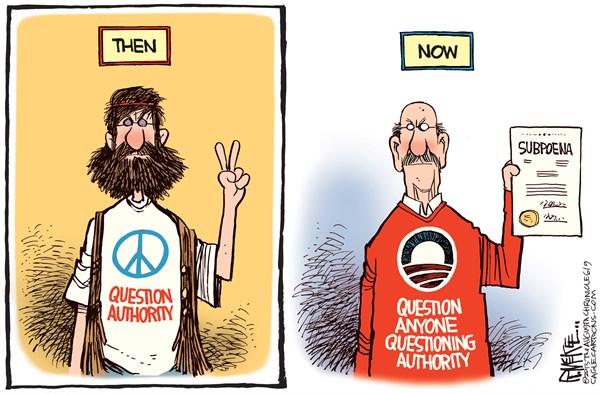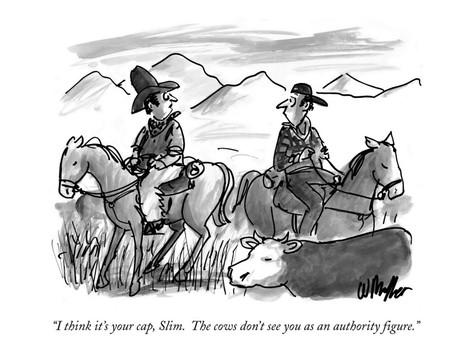|
home | what's new | other sites | contact | about |
|||||||||
|
Word Gems exploring self-realization, sacred personhood, and full humanity
Authority
“[I had decried using] authority as a means of applying pressure. And [yet] here I was, using a little piece of paper to pretend I had authority... However, it appears that most of life's mechanisms rely on similar tricks -- marriages, companies, nation-states, armies.” -- Anonymous, A Woman in Berlin: Eight Weeks in the Conquered City
Editor's 1-Minute Essay: Authority Editor’s Essay: What does it mean to be a great man or woman?
Anne Bradstreet: “Authority without wisdom is like a heavy axe without an edge, fitter to bruise than polish.” Henry David Thoreau: “Any fool can make a rule, and any fool will mind it.”
Editor's note: Consider what Krishnamurti said about "authority" in the following passage:
Jiddu Krishnamurti, the famous "dissolution speech," August 3, 1929: "Truth, being limitless, unconditioned, unapproachable by any path whatsoever, cannot be organized; nor should any organization be formed to lead or to coerce people along any particular path… Truth cannot be brought down, rather the individual must make the effort to ascend to it... You are accustomed to authority, or to the atmosphere of authority, which you think will lead you to spirituality. You think and hope that another can, by his extraordinary powers -- a miracle -- transport you to this realm of eternal freedom which is Happiness. Your whole outlook on life is based on that authority... You are all depending for your spirituality on someone else, for your happiness on someone else, for your enlightenment on someone else… Organizations cannot make you free. No man from outside can make you free; nor can organized worship, nor the immolation of yourselves for a cause, make you free; nor can forming yourselves into an organization, nor throwing yourselves into works, make you free… Again, you have the idea that only certain people hold the key to the Kingdom of Happiness. No one holds it. No one has the authority to hold that key. That key is your own self, and in the development and the purification and in the incorruptibility of that self alone is the Kingdom of Eternity. So you will see how absurd is the whole structure that you have built, looking for external help, depending on others for your comfort, for your happiness, for your strength. These can only be found within yourselves. You are accustomed to being told how far you have advanced, what is your spiritual status. How childish! Who but yourself can tell you if you are beautiful or ugly within? Who but yourself can tell you if you are incorruptible?"
Noam Chomsky: “I think it only makes sense to seek out and identify structures of authority, hierarchy, and domination in every aspect of life, and to challenge them; unless a justification for them can be given, they are illegitimate, and should be dismantled, to increase the scope of human freedom.”
James Madison: “I believe there are more instances of the abridgment of the freedom of the people by gradual and silent encroachments of those in power than by violent and sudden usurpations.” Galileo Galilei: “For in the sciences the authority of thousands of opinions is not worth as much as one tiny spark of reason in an individual man. Besides, the modern observations deprive all former writers of any authority, since if they had seen what we see, they would have judged as we judge.”
Tacitus: “If you would know who controls you, see who you may not criticize.”
Albert Einstein: “To punish me for my contempt for authority, fate made me an authority myself.” James Madison, letter to the Rev. Jasper Adams, January 1, 1832: “It may not be easy, in every possible case, to trace the line of separation between the rights of religion and the Civil authority with such distinctness as to avoid collisions and doubts on unessential points. The tendency to usurpation on one side or the other, or to a corrupting coalition or alliance between them, will be best guarded agst. by an entire abstinence of the Govt. from interference in any way whatsoever, beyond the necessity of preserving public order, and protecting each sect agst. trespasses on its legal rights by others.” Baruch De Spinoza: “Those who wish to seek out the cause of miracles and to understand the things of nature as philosophers, and not to stare at them in astonishment like fools, are soon considered heretical and impious, and proclaimed as such by those whom the mob adores as the interpreters of nature and the gods. For these men know that, once ignorance is put aside, that wonderment would be taken away, which is the only means by which their authority is preserved.”
Timothy Leary: “Throughout human history, as our species has faced the frightening, terrorizing fact that we do not know who we are, or where we are going in this ocean of chaos, it has been the authorities, the political, the religious, the educational authorities who attempted to comfort us by giving us order, rules, regulations, informing, forming in our minds their view of reality. To think for yourself you must question authority and learn how to put yourself in a state of vulnerable, open-mindedness; chaotic, confused, vulnerability to inform yourself.” Noam Chomsky: “As long as some specialized class is in a position of authority, it is going to set policy in the special interests that it serves… The question is whether privileged elites should dominate mass-communication, and should use this power as they tell us they must, namely, to impose necessary illusions, manipulate and deceive the stupid majority, and remove them from the public arena.” Stanley Milgram: “Ordinary people, simply doing their jobs, and without any particular hostility on their part, can become agents in a terrible destructive process. Moreover, even when the destructive effects of their work become patently clear, and they are asked to carry out actions incompatible with fundamental standards of morality, relatively few people have the resources needed to resist authority… The disappearance of a sense of responsibility is the most far-reaching consequence of submission to authority.” Aleksandr Solzhenitsyn, The Gulag Archipelago: “Power is a poison well known for thousands of years. If only no one were ever to acquire material power over others! But to the human being who has faith in some force that holds dominion over all of us, and who is therefore conscious of his own limitations, power is not necessarily fatal. For those, however, who are unaware of any higher sphere, it is a deadly poison. For them there is no antidote.”
Erich Maria Remarque, All Quiet on the Western Front: “The idea of authority, which they represented, was associated in our minds with a greater insight and a more humane wisdom.” Albert Einstein: “Unthinking respect for authority is the greatest enemy of truth.” C.S. Lewis, The Case for Christianity: “Don't be scared by the word authority. Believing things on authority only means believing them because you've been told them by someone you think trustworthy. Ninety-nine per cent of the things you believe are believed on authority. I believe there is such a place as New York. I haven't seen it myself. I couldn't prove by abstract reasoning that there must be such a place. I believe it because reliable people have told me so. The ordinary man believes in the Solar System, atoms, evolution, and the circulation of the blood on authority -because the scientists say so. Every historical statement in the world is believed on authority. None of us has seen the Norman Conquest or the defeat of the Armada. None of us could prove them by pure logic as you prove a thing in mathematics. We believe them simply because people who did see them have left writings that tell us about them: in fact, on authority. A man who jibbed at authority in other things as some people do in religion would have to be content to know nothing all his life.”
Deng Ming-Dao: “The idea that each of us can be directly spiritual [without a professional intermediary] is radical. Most religions are based not on teaching adherents to be directly spiritual, but in persuading them to trust in the intercession of ministers or priests. The problem with this approach is that we cannot gain access to spirituality except through the medium of a fallible human being. If we want to see Tao, we need only open our eyes and trust what we see.” Carl Sagan: “Arguments from authority carry little weight – authorities have made mistakes in the past. They will do so again in the future. Perhaps a better way to say it is that in science there are no authorities; at most, there are experts.” L. Frank Baum: “Oh, if Shakespeare says it, that's all right.” Elizabeth Prentiss: “People ask me how it happens that my children are all so promptly obedient and so happy. As if it chanced that some parents have such children or chanced that some have not! I am afraid it is only too true, as someone has remarked, that "this is the age of obedient parents!" What then will be the future of their children? How can they yield to God who have never been taught to yield to human authority? And how well fitted will they be to rule their own households who have never learned to rule themselves?” Editor's note: How shall they be taught if not led by some totalitarian decree? I hate to be the one to break the news to Ms. Prentiss here, but the answer is, we shall all be taught by the inner-guidance, that is, directly from God. Hilari Bell, Rise of a Hero: “And you are going to close the gates, because I told you to close the gates.” R.C. Sproul: “It is a profound political reality that Christ now occupies the supreme seat of cosmic authority. The kings of this world and all secular governments may ignore this reality, but they cannot undo it. The universe is no democracy. It is a monarchy. God himself has appointed his beloved Son as the preeminent King. Jesus does not rule by referendum, but by divine right. In the future every knee will bow before him, either willingly or unwillingly. Those who refuse to do so will have their knees broken with a rod of iron.” Editor's note: Religionists like the "rod of iron" view of Jesus because, in their totalitarian ways, that's how they'd like to run things, with many broken knees, if they had the chance. Gretchen Rubin: “The harder the push, the greater the Rebel push-back. I laughed when a Rebel friend told me, 'No one can tell me to do anything. I recently got an email saying ‘Please read’ in the subject line, and I immediately deleted it.”
Amit Kalantri: “In dictatorship people feared the king, in democracy they fear criticism [and therefore they invented “political correctness,” an attempt to censor thought and dissent].” Jiddu Krishnamurti: “So you see that you cannot depend upon anybody. There is no guide, no teacher, no authority. There is only you - your relationship with others and with the world - there is nothing else. When you realize this, it either brings great despair, from which comes cynicism and bitterness, or, in facing the fact that you and nobody else is responsible for the world and for yourself, for what you think, what you feel, how you act, all self-pity goes.”
Loren Weisman: “Publishing a book does not make you an authority or an expert. Authorship does not equal authority.” Antonin Sertillanges: “The more a man departs from lawful authority, that is, authority normally constituted, whether by God or by the nature of things, the more he is obliged to fall back into arbitrary claims to authority… To upset the order of nature, and even more the order of God, who, for us, is more natural than nature itself, is to destroy the harmony of forces; and violence, unbending against the rebellion of things, against the more terrible rebellion of souls, is the only refuge of him who wishes to maintain unity at all costs.” Sigmund Freud: “It is asking a great deal of a man, who has learnt to regulate his everyday affairs in accordance with the rules of experience and with due regard to reality, that he should entrust precisely what affects him most nearly to the care of an authority which claims as its prerogative freedom from all the rules of rational thought.” Richard Dawkins: “The habit of questioning authority is one of the most valuable gifts that a book, or a teacher, can give a young would-be scientist.” Mikhail Bakunin: “If there is an undeniable fact, attested to a thousand times by experience, it is the corrupting effect produced by authority on those who manipulate it. It is absolutely impossible for a man who wields power to remain a moral man.... Does it follow that I reject all authority? Perish the thought. In the matter of boots, I defer to the authority of the bootmaker; concerning houses, canals, or railroads, I consult the architect or the engineer… But I allow neither the bootmaker nor the architect… to impose his authority on me. I listen to them freely and with all the respect merited by their intelligence, their character, their knowledge, reserving always my incontestable right of criticism and censure. I do not content myself with consulting a single authority in any special branch; I consult several; I compare their opinions and choose that which seems to me soundest. But I recognize no infallible authority, even in special questions; consequently, whatever respect I may have for the honesty and the sincerity of an individual, I have no absolute faith in any person. Such a faith would be fatal to my reason, to my liberty, and even to the success of my undertakings; it would immediately transform me into a stupid slave, the tool of other people's will and interests.” Alexander McCall Smith, The Good Husband of Zebra Drive: “But then she reminded herself that there were plenty of people who were afraid of the police, even if they had clear consciences. These were people who had been the victims of bullying when young--bullying by severe teachers, by stronger children; there were so many ways in which people could be crushed. Such people might fear the police in the same way in which they feared all authority.” Noam Chomsky, Understanding Power: “Every government has a need to frighten its population, and one way of doing that is to shroud its working in mystery. The idea that a government has to be shrouded in mystery is something that goes back to Herodotus [who] describes how the Medes and others won their freedom by struggle, and then they lost their freedom when the institution of royalty was invented to create a cloak of mystery around power. See, the idea behind royalty was that there’s this other species of individuals who are beyond the norm and who the people are not supposed to understand. That’s the standard way you cloak and protect power: you make it look mysterious and secret, above the ordinary person? otherwise why should anybody accept it? Well, they’re willing to accept it out of fear that some great enemies are about to destroy them, and because of that they’ll cede their authority to the Lord, or the King, or the President or something, just to protect themselves. That’s the way governments work; that’s the way any system of power works; and the secrecy of the system is part of it.” Carol Lynn Pearson: “When my eternal, temple-blessed marriage shattered and everything that had been meaningful lay in jumbled shards around me, I had to slowly and carefully pick up every single piece and examine it, turning it over and over, to see if it was worthy to keep and to use in building a new house of meaning. As I gathered the broken pieces of God, I used only my own authority, only my own relationship with the divine, and the good, small voice that speaks inside me, to appraise them. I threw away many, and I kept many, assembling the bright pieces into One Great Thought. I asked only, ‘Do I see God's fingerprints on this? Does this little piece feel godly? Does it speak of love?’ That made it easy. I was forever finished with the insane attempt to love a God who hurts me.”
Suzy Kassem, Rise Up and Salute the Sun: "We embrace illusions [which] become popular because they are pounded at us by the media with … a high level of repetition that [it] disguises lies and truths. And like obedient schoolchildren, we do not question their validity and swallow everything up like medicine. Why? Because since the earliest days of our youth, we have been conditioned to accept that the direction of the herd, and authority anywhere — is always right.” Osho, Zen: The Path of Paradox: “Zen gives you tremendous dignity. There is no authority anywhere. Freedom is utter and ultimate.” Graeme Rodaughan: “Behind every unquestionable belief is a system of control.” Agatha Christie, Death Comes as the End: “[People] create a false door - to deceive. If they are conscious of weakness, of inefficiency, they make an imposing door of self-assertion, of bluster, of overwhelming authority - and, after a time, they get to believe in it themselves. They think, and everybody thinks, that they are like that. But behind that door … is bare rock.” Robert Ferrigno, Sins of the Assassin: “Give the agent something easy to reject, something to justify his authority - that way they won't look too closely at the rest of your things.” James C. Dobson: “Well, there is no sin in being gay. The immorality comes from engaging in forbidden behavior. Therefore, the Christian homosexual is in the same situation as the unmarried heterosexual. He (or she) is expected to control his or her lusts and live a holy life. I know this is a tough position to take, and some will argue with it. But I stand on the authority of Scripture, and I have no license to edit it.” Life In Two Spheres, or Scenes in the Summerland, by Hudson Tuttle, channeled testimony from the other side: "Wretch! Wretch! Wretch,” he exclaimed in anguish."Oh, that I had never been born!” The Sage, taking him by the hand, raised him up, saying: "Self-accusing child, why blame yourself thus? Blame no one for their follies, but the circumstances in which you were placed. They were bad; popular opinion, before which you bent , was bad. All tended to make you what you were. You have a germ of native goodness in your being, or you would not thus accuse yourself. Arise! weep no more! The future is bright.” ... "You have corrected me aright; I acknowledge your superior spiritual powers of perception reverentially." "Reverence not me; I am no more than the others. We acknowledge submission to no one. Each is his own individual sovereign, to think and act as best pleases himself, if he is regardful of the rights of others and is measured by his worth alone. If you are thankful express it, not by words or gestures, but by actions. Reverence not me, but truth. You are still prejudiced on this and kindred subjects, and your prejudice must be overcome." Suzy Kassem, Rise Up and Salute the Sun: “Let's face it. We live in a command-based system, where we have been programmed since our earliest school years to become followers, not individuals. We have been conditioned to embrace teams, the herd, the masses, popular opinion -- and to reject what is different, eccentric or stands alone. We are so programmed that all it takes for any business or authority to condition our minds to follow or buy something is to simply repeat a statement more than three or four times until we repeat it ourselves and follow it as truth or the best trendiest thing. This is called 'programming' -- the frequent repetition of words to condition us how to think, what to like or dislike, and who to follow.” Henry David Thoreau: “There will never be a really free and enlightened State until the State comes to recognize the individual as a higher and independent power, from which all its own power and authority are derived, and treats him accordingly.” Dalai Lama: “The ultimate authority must always rest with the individual's own reason and critical analysis.” Shakti Gawain: “When we consistently suppress and distrust our intuitive knowingness, looking instead for authority, validation, and approval from others, we give our personal power away.” Robert Hall: “Mankind are apt to be strongly prejudiced in favor of whatever is countenanced by antiquity, enforced by authority, and recommended by custom.” William O. Douglas: "Since when have we Americans been expected to bow submissively to authority and speak with awe and reverence to those who represent us?” Thomas Huxley: “Every great advance in natural knowledge has involved the absolute rejection of authority… The ultimate court of appeal is observation and experiment... not authority.” Grace Jones: “I was born into a very religious family where everything was about setting the right example for the community and having to obey orders blindly. I felt that everyone was growing up in the world, except me. This is probably one of the reasons why I had such a rebellious attitude towards any form of authority.” Ryszard Kapuscinski: “There are several reasons why Russians view the oppressive state positively. First, in the Russian Orthodox religion, there is an understanding of authority as something sent by God.” Kyle Chandler: “When I'm around authority, I still feel like I'm 14 or 15 years old.” Carl Sagan: “One of the great commandments of science is, ‘Mistrust arguments from authority.’ (Scientists, being primates, and thus given to dominance hierarchies, of course do not always follow this commandment.) Too many such arguments have proved too painfully wrong. Authorities must prove their contentions like everybody else. This independence of science, its occasional unwillingness to accept conventional wisdom, makes it dangerous to doctrines less self critical, or with pretensions of certitude.”
G.K. Chesterton: “For the modern world will accept no dogmas upon any authority; but it will accept any dogmas on no authority. Say that a thing is so, according to the Pope or the Bible, and it will be dismissed as a superstition without examination. But preface your remark merely with 'they say' or 'don't you know that?' or try (and fail) to remember the name of some professor mentioned in some newspaper; and the keen rationalism of the modern mind will accept every word you say.” Jiddu Krishnamurti: “Because we want to be inwardly secure, we are constantly seeking methods and means for this security, and thereby we create authority, the worship of another, which destroys comprehension, that spontaneous tranquility of mind in which alone there can be a state of creativeness.” Jiddu Krishnamurti: “There is no method of self-knowledge. Seeking a method invariably implies the desire to attain some result – and that is what we all want. We follow authority – if not that of a person, then of a system, of an ideology – because we want a result that will be satisfactory, which will give us security. We really do not want to understand ourselves, our impulses and reactions, the whole process of our thinking, the conscious as well as the unconscious; we would rather pursue a system that assures us of a result. But the pursuit of a system is invariably the outcome of our desire for security, for certainty, and the result is obviously not the understanding of oneself. When we follow a method, we must have authorities – the teacher, the guru, the savior, the Master – who will guarantee us what we desire, and surely that is not the way of self-knowledge. Authority prevents the understanding of oneself, does it not? Under the shelter of an authority, a guide, you may have temporarily a sense of security, a sense of well-being, but that is not the understanding of the total process of oneself. Authority in its very nature prevents the full awareness of oneself and therefore ultimately destroys freedom; in freedom alone can there be creativeness. There can be creativeness only through self-knowledge.” Jiddu Krishnamurti: “One of the fundamental causes of the disintegration of society is copying, which is the worship of authority.” Carl R. Rogers: “When the locus of evaluation is seen as residing in the expert, it would appear that the long-range social implications are in the direction of the social control of the many by the few.” Frank Herbert: “Don't give over all of your critical faculties to people in power, no matter how admirable those people may appear to be. Beneath the hero's facade you will find a human being who makes human mistakes. Enormous problems arise when human mistakes are made on the grand scale available to a superhero. And sometimes you run into another problem. It is demonstrable that power structures tend to attract people who want power for the sake of power and that a significant proportion of such people are imbalanced — in a word, insane.” Margaret Thatcher: “Power is like being a lady... if you have to tell people you are, you aren't.” C. Wright Mills: “Those in authority within institutions and social structures attempt to justify their rule by linking it, as if it were a necessary consequence, with moral symbols, sacred emblems, or legal formulae which are widely believed and deeply internalized. These central conceptions may refer to a god or gods, the 'votes of the majority,' the 'will of the people,' the 'aristocracy of talents or wealth,' to the 'divine right of kings' or to the alleged extraordinary endowment of the person of the ruler himself.” Thomas Paine, The Age of Reason: “People in general know not what wickedness there is in this pretended word of God. Brought up in habits of superstition, they take it for granted that the Bible is true, and that it is good; they permit themselves not to doubt of it, and they carry the ideas they form of the benevolence of the Almighty to the book which they have been taught to believe was written by his authority. Good heavens! it is quite another thing, it is a book of lies, wickedness, and blasphemy.” John C. Polanyi: “Authority in science exists to be questioned, since heresy is the spring from which new ideas flow.” Marilyn Vos Savant: “I think one of the problems [with raising intelligent children in modern society] is compulsory schooling...and that children are sitting there, and they are taught and told what to believe; they are passive from the very beginning – and one must be very, very aggressive intellectually to have a high IQ.” Sue Monk Kidd: “The ultimate authority of my life is not the Bible; it is not confined between the covers of a book. It is not something written by men and frozen in time. It is not from a source outside myself. My ultimate authority is the divine voice in my own soul. Period.”
Chris Hedges, Empire of Illusion: The End of Literacy: “Most of these students are so conditioned to success that they become afraid to take risks. They have been taught from a young age by zealous parents, schools, and institutional authorities what constitutes failure and success. They are socialized to obey. They obsess over grades and seek to please professors, even if what professors teach is fatuous. The point is to get ahead, and getting ahead means deference to authority. Challenging authority is never a career advancer.” Madalyn Murray O'Hair: “Atheism may be defined as the mental attitude which unreservedly accepts the supremacy of reason and aims at establishing a lifestyle and ethical outlook verifiable by experience and the scientific method, independent of all arbitrary assumptions of authority and creeds.” Ludwig Feuerbach: “Wherever morality is based on theology, wherever right is made dependent on divine authority, the most immoral, unjust, infamous things can be justified and established.” Emma Goldman, Red Emma Speaks: “Americans are so easily hoodwinked by the sanctity of law and authority. In fact, the pattern of life has become standardized, routinized, and mechanized like canned food and Sunday sermons. The hundred-percenter easily swallows syndicated information and factory-made ideas and beliefs. He thrives on the wisdom given him over the radio and cheap magazines by corporations whose philanthropic aim is selling America out. He accepts the standards of conduct and art in the same breath with the advertising of chewing gum, toothpaste, and shoe polish. Even songs are turned out like buttons or automobile tires -- all cast from the same mold.” Robert Ringer: “Every person has the inherent right to ‘self-proclaim’ -- to announce, at any time he chooses, that he is on any level he chooses to be on.” Erica Goros: “I'm of the age and immaturity level that I cannot give you my respect solely because you are older or ranked higher on an imaginary totem pole.” Swami Vivekananda: “Do not believe a thing because you have read about it in a book. Do not believe a thing because another man has said it was true. Do not believe in words because they are hallowed by tradition. Find out the truth for yourself. Reason it out. That is realization.” Oscar Wilde, The Soul of Man Under Socialism: “All authority is quite degrading. It degrades those who exercise it, and degrades those over whom it is exercised. When it is violently, grossly, and cruelly used, it produces a good effect by creating, or at any rate bringing out, the spirit of revolt and individualism that is to kill it. When it is used with a certain amount of kindness, and accompanied by prizes and rewards, it is dreadfully demoralising. People, in that case, are less conscious of the horrible pressure that is being put on them, and so go through their lives in a sort of coarse comfort, like petted animals, without ever realising that they are probably thinking other people's thoughts, living by other people's standards, wearing practically what one may call other people's second-hand clothes, and never being themselves for a single moment.”
|
|||||||||
|
|
